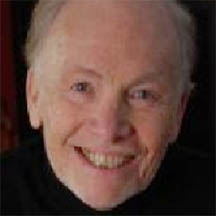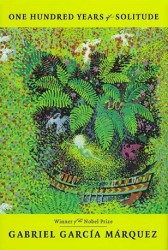An essay on Gabriel Garcia Marquez
By Robert Kiely
To speak of a land of enchantment, even in reference to a contemporary novel, is to conjure up images of elves, moonbeams and slippery mountains. Along with the midgets and fairies, one can expect marvelous feats and moral portents, but not much humor and almost certainly no sex. The idea, it would seem, is to forget the earth. At least that is one idea of enchantment.
It is obviously not shared by the Colombian novelist Gabriel García Márquez, who has created in One Hundred Years of Solitude an enchanted place that does everything but cloy. Macondo oozes, reeks and burns even when it is most tantalizing and entertaining. It is a place flooded with lies and liars and yet it spills over with reality. Lovers in this novel can idealize each other into bodiless spirits, howl with pleasure in their hammocks or, as in one case, smear themselves with peach jam and roll naked on the front porch. The hero can lead a Quixotic expedition across the jungle, but although his goal is never reached, the language describing his quest is pungent with life:
“The men on the expedition felt overwhelmed by their most ancient memories in that paradise of dampness and silence, going back to before original sin, as their boots sank into pools of steaming oil and their machetes destroyed bloody lilies and golden salamanders. For a week, almost without speaking, they went ahead like sleepwalkers through a universe of grief, lighted only by the tenuous reflection of luminous insects, and their lungs were overwhelmed by a suffocating smell of blood.”
 This is the language of a poet who knows the earth and does not fear it as the enemy of the dreamer.
This is the language of a poet who knows the earth and does not fear it as the enemy of the dreamer.
Near the end of One Hundred Years of Solitude a character finds a parchment manuscript in which the history of his family had been recorded “one hundred years ahead of time” by an old gypsy. The writer “had not put events in the order of man’s conventional time, but had concentrated a century of daily episodes in such a way that they coexisted in one instant.” The narrative is a magician’s trick in which memory and prophecy, illusion and reality are mixed and often made to look the same. It is, in short, very much like Márquez’s astonishing novel.
It is not easy to describe the techniques and themes of the book without making it sound absurdly complicated, labored and almost impossible to read. In fact, it is none of these things. Though concocted of quirks, ancient mysteries, family secrets and peculiar contradictions, it makes sense and gives pleasure in dozens of immediate ways.
The family chronicle centers on five generations of descendants of José Arcadio Buendía and his wife Ursula, who sometime early in the 19th century founded the village of Macondo on a river of clear water somewhere in South America. The uncertainties about time and place, like other factual puzzles in the book, are not fashionable evasions on the part of the author but genuine reflections of the minds of the people about whom he is writing. From the beginning we are told that Buendía knew nothing about the geography of the region. He comes to love maps and compasses, but his sense of where he is remains very much his own. He plays with an astrolabe and sextant, but, with characteristic excess, almost contracts sunstroke “from trying to establish an exact method to ascertain noon.”
 The book is a history, not of governments or of formal institutions of the sort which keeps public records, but of a people who, like the earliest descendants of Abraham, are best understood in terms of their relationship to a single family. In a sense, José and Ursula are the only two characters in the story, and all their children, grandchildren and great-grandchildren are variations on their strengths and weaknesses. José, forever fascinated by the unknown, takes up project after project, invention after invention, in order among other things, to make gold, discover the ocean and photograph God. He eventually goes mad, smashes things, refuses to speak except in Latin and is tied to a giant chestnut tree in the middle of the family garden.
The book is a history, not of governments or of formal institutions of the sort which keeps public records, but of a people who, like the earliest descendants of Abraham, are best understood in terms of their relationship to a single family. In a sense, José and Ursula are the only two characters in the story, and all their children, grandchildren and great-grandchildren are variations on their strengths and weaknesses. José, forever fascinated by the unknown, takes up project after project, invention after invention, in order among other things, to make gold, discover the ocean and photograph God. He eventually goes mad, smashes things, refuses to speak except in Latin and is tied to a giant chestnut tree in the middle of the family garden.
Ursula is the personification of practical endurance and sheer will. It is she who mends the pieces and sweeps the house clean after disaster; it is she who continues to raise various offspring long after her own children have grown to adulthood, and it is she who remains strong and clear-headed until the age of 114 or 122—as usual, no one is quite sure.
A mixture of obsessive idealism and durable practicality informs the lives of the Buendía descendants. The males, all named Arcadio or Aureliano, go off to sea, lead revolutions, follow gypsies, fall disastrously in love with their sisters and aunts (except one who develops a passion for a 12-year-old-girl) but most of them add to the family’s stature and wealth and all contribute generously to its number. The women are not overshadowed by the men. One eats dirt when she is depressed; another burns her hand in the oven and wears a black cloth over it for life when her lover commits suicide, another, named Remedios the Beauty, is so innocent that one day when folding linen in the backyard she ascends into heaven with the family sheets.
But to isolate details, even good ones, from this novel is to do it particular injustice. Márquez creates a continuum, a web of connections and relationships. However bizarre or grotesque some particulars may be, the larger effect is one of great gusto and good humor and, even more, of sanity and compassion. The author seems to be letting his people half-dream and half-remember their own story and what is best, he is wise enough not to offer excuses for the way they do it. No excuse is really necessary. For Macondo is no never-never land. Its inhabitants do suffer, grow old and die, but in their own way.
Various hard and familiar aspects of reality intrude on their world all the time. What seems unreal or at least unconventional to an outsider is the manner in which the Buendías respond to and explain facts like birth, death, war, sickness and even weather. When it gets hot in Macondo, it gets so hot that men and beasts go mad and birds attack houses. A long spell of rain is remember to have lasted, not weeks, but four years, eleven months and two days. When a plague hits the region, it is no ordinary killer but an “insomnia plague,” which gradually causes people to forget everything including the names and uses of the most commonplace objects. In order to combat the memory loss, the villagers label chairs and clocks and even hang a sign on the cow: “This is the cow. She must be milked every morning so that she will produce milk, and the milk must be boiled in order to be mixed with coffee to make coffee and milk.”
More serious than bad weather or plague are the intrusions from outside, the mysterious gypsies, the corrupt government officials, the brutal soldiers (both Conservative and Liberal), the foppish Italian piano tuner, the ingenious French prostitutes and, finally, with the railroad, the sweating gringos “planning to plant banana trees in the enchanted region that José Arcadio Buendía and his men had crossed in search of the route” to the sea. At first it looks as though the North Americans will be absorbed into the dream life of Macondo, but they do mean to change things, including the terrain and the weather, and they do eventually build their own sensible counterpart to Macondo, a village of houses in neat rows with tennis courts and swimming pools.
It might have been just another phase in the incestuous life of Macondo, like the 32 revolutions or the insomnia plague, but enchantment and solitude cannot survive the gringos any more than they can avoid the 20th century. Like so much else in this strange and moving narrative, the end seems to have been inevitable. And yet the North American reader—in thinking of this narrative filled with haunting creatures and events—can hardly help being particularly haunted by the spectacle of his countrymen, “the perspiring guests—who did not even know who their hosts were—[trooping] in to occupy the best places at the table.” Márquez has shown us, with extraordinary art, who some of the hosts were or, what is more important, who they thought they were. He has also written a novel so filled with humor, rich detail and startling distortion that it brings to mind the best of Faulkner and GŸnter Grass. It is a South American Genesis, an earthy piece of enchantment, more, as the narrator says of Macondo, “an intricate stew of truth and mirages.”
Stew is too modest an image with which to describe the wit and power of this lusty fantasia, but if the strong savor banishes visions of twinkletoes, it has served a purpose.
Mr. Kiely is a professor of English at Harvard.








